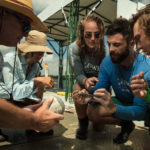UWF earns first-ever “Green College” recognition by Princeton Review
By Kelly Russ, University Communications
The University of West Florida was recognized for the first time as one of the country’s most environmentally responsible colleges by The Princeton Review, which produces “The Princeton Review’s Guide to 311 Green Colleges: 2011 Edition”, just in time for the April 22 celebration of Earth Day.
The selected institutions are chosen based on “Green Rating” scores based on data from a 50-question survey about environmental and sustainability-related commitments and initiatives. The schools listed in the guide received scores in the 80th percentile or higher.
“UWF is committed to showing leadership, not just in environmental education and research, but also by operating in an environmentally sustainable fashion,” said Michael Dieckmann, interim vice president for administrative affairs. “We seek to be a good citizen by minimizing our negative impact on the environment and supporting the sustainability values that are so important to our students, employees and community members.”
Among notable initiatives are UWF’s goal to build new facilities that meet or exceed LEED standards. The School of Science and Engineering Building, opened in 2009, earned LEED Gold Certification. Heritage Hall, a residence hall opened in 2010, is expected to earn LEED Gold Certification. Further, UWF’s Office of Environmental Sustainability (OES) has been charged with upgrading existing facilities to meet LEED standards.
The OES also oversees UWF’s recycling program, and the University currently has a 35 percent recycling rate. “In this year’s RecycleMania waste-minimization competition, UWF placed 47 out of 181 schools nationally, and in Recycling competition we beat the University of Florida, Florida State, University of Central Florida and the University of South Florida,” said Larry McGrady, program manager for environmental sustainability.
The OES is focused on three initiatives related to sustainability, including an audit of UWF’s greenhouse gas emissions, reducing campus energy usage and reducing waste/increasing recycling to comply with Florida’s 75 percent recycling goal.
McGrady encourages faculty, staff and students to get involved in UWF’s efforts.
“There are UWF student-led environmental groups that are proactive in both the campus and Pensacola communities,” he said. “And please recycle.”
To produce the Guide to Green Colleges, the Princeton Review worked with ecoAmerica, an environmental nonprofit research organization, and the U.S. Green Building Council, which developed the Leadership in Energy & Environmental Design green building certification. Institutions are evaluated on a commitment to building at LEED standards, sustainability committees, environmental literacy programs, the use of renewable energy resources and recycling and conservation programs.
For more information about UWF’s environmentally sustainable initiatives, visit the Office of Environmental Sustainability online at uwf.edu/sustainability/.


